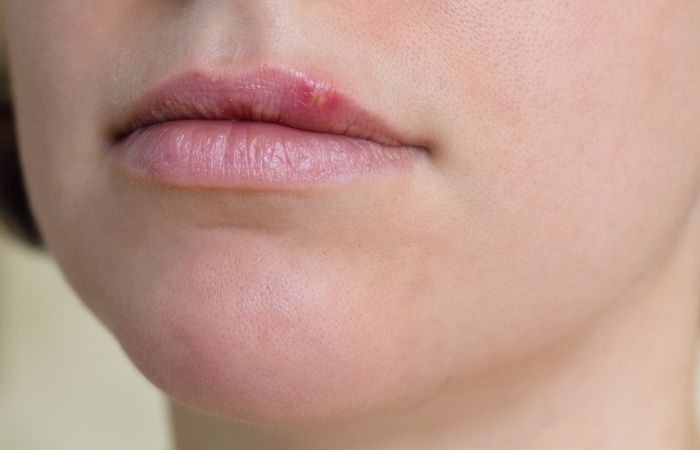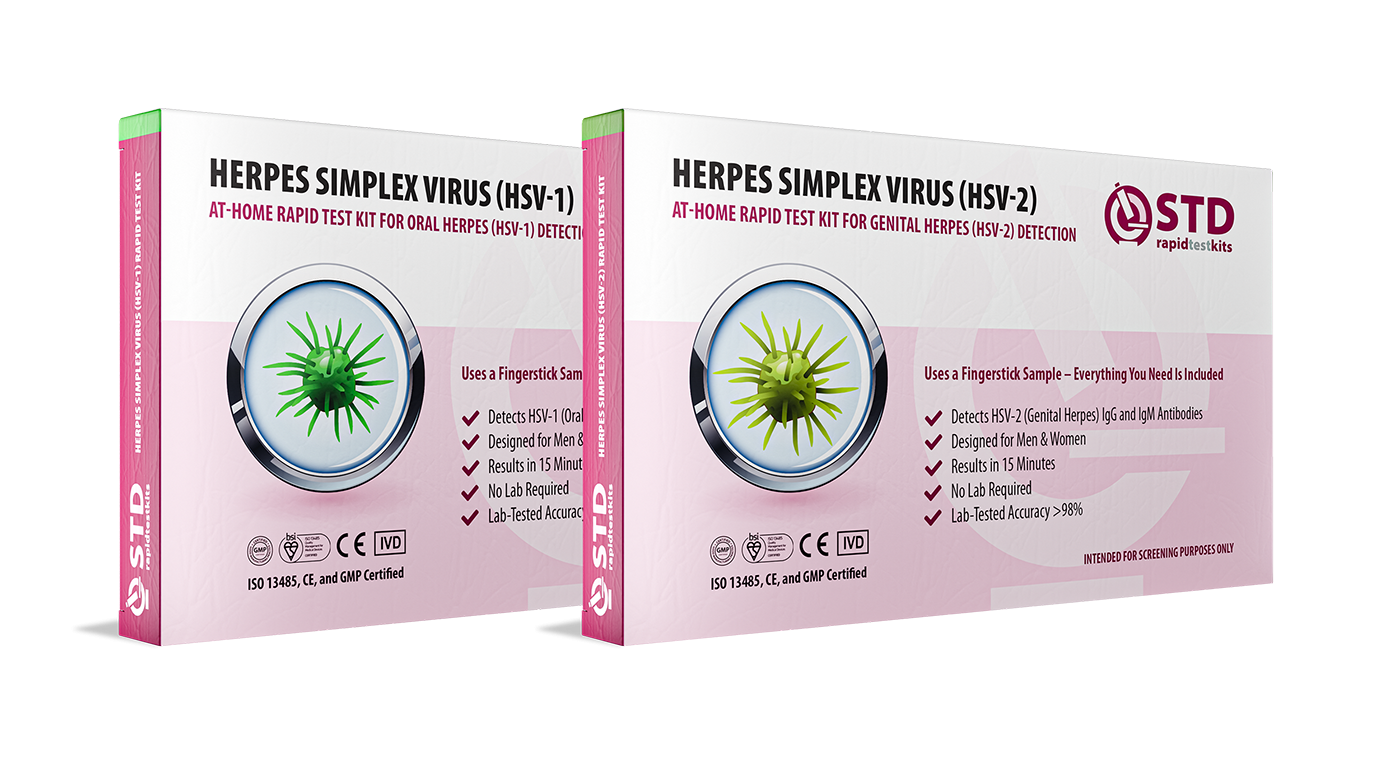Herpes 101: What HSV-1 and HSV-2 Actually Are
Herpes Simplex Virus Type 1 (HSV-1) usually causes cold sores around the mouth, but it can also infect the genitals through oral sex. HSV-2 primarily causes genital herpes, but both viruses are lifelong, incurable, and wildly underestimated.
- HSV-1: Often acquired in childhood, usually through nonsexual contact. Lives in the trigeminal nerve near the face.
- HSV-2: More likely transmitted sexually and prefers the genital/anal region. Resides in the sacral ganglia near the spine.
Many people who test positive for either type never remember an outbreak.

People are also looking for: Is it safe to test for herpes at home?
Asymptomatic Herpes Is Real (And It’s Common)
You don’t need visible blisters or sores to have herpes. According to the CDC, nearly 87% of people with HSV-2 don’t know they have it. For HSV-1, that number is even higher.
- Symptom-Free Doesn’t Mean Virus-Free: You may never have a single outbreak, yet the virus can still live in your body and spread to others.
- Silent Shedding: HSV can be active on your skin even without visible symptoms. This is called asymptomatic viral shedding.
A study in JAMA Dermatology found that people with HSV-2 shed the virus on about 10% of days, even when they had no signs or symptoms.
Why You Might Not Notice It
Some outbreaks are so mild they’re mistaken for:
- Ingrown hairs
- Razor burn
- Bug bites
- Yeast infections
- Pimples or “heat rash”
Others might happen internally (like inside the vagina or rectum) and go completely undetected. People with penises might notice nothing more than a tiny red bump that disappears within a day. That’s why herpes often flies under the radar.
How Herpes Spreads, Even With No Symptoms
Herpes is most contagious during an active outbreak, but it can also spread through asymptomatic shedding, when the virus reactivates on the skin without any visible signs.
- Skin-to-skin contact: Genital, oral, or anal, herpes doesn’t need ejaculation or penetration to spread.
- Oral sex: HSV-1 on the mouth can infect a partner’s genitals.
- Kissing: A person with HSV-1 can transmit the virus even without a visible cold sore.
Condoms help, but they can’t cover all skin-to-skin areas.
Check Your STD Status in Minutes
Test at Home with RemediumGenital & Oral Herpes Test Kit

 For Men & Women
For Men & Women Results in Minutes
Results in Minutes No Lab Needed
No Lab Needed Private & Discreet
Private & DiscreetOrder Now $75.00 $98.00
For all 2 tests
Can You Get Herpes and Never Have an Outbreak?
Yes. Some people go their entire lives without a single lesion, sore, or blister. That doesn’t mean the virus isn’t present, it just means your immune system is keeping it in check.
This is especially true for:
- People who acquired HSV-1 orally in childhood (then it reactivates genitally during adulthood)
- People exposed to HSV-2 through a partner who didn’t know they were shedding
You could carry herpes for months or even years before experiencing your “first” outbreak, if it ever happens.
Testing for Herpes: When to Do It (Even Without Symptoms)
Most standard STD panels do not include herpes testing unless you specifically ask. That’s a big problem when most carriers don’t have visible symptoms.
You should consider getting tested if:
- You’ve had unprotected sex with a new partner
- Your partner has herpes or cold sores
- You’ve had a past STD or symptoms that didn’t make sense
- You’re entering a new relationship and want to screen proactively
At-home kits like the Genital Herpes 2 Rapid Test Kit allow you to get results discreetly and quickly.
Herpes Shedding: What It Is and Why It Matters
Herpes shedding refers to the release of the virus from the skin, even when there are no symptoms. This can happen during:
- Stress
- Hormonal shifts (e.g., during menstruation)
- Fever or illness
- Sexual activity
People with HSV-2 shed more frequently than those with HSV-1, but both can spread silently. According to Sexually Transmitted Infections Journal, up to 70% of genital herpes transmissions occur during asymptomatic periods.
How to Protect Yourself and Your Partners
Even if you don’t have visible symptoms, you can reduce your risk of spreading herpes:
- Use condoms or dental dams every time
- Avoid sex during any genital tingling, itching, or discomfort
- Consider daily suppressive therapy with antiviral meds like valacyclovir
- Get tested regularly if you’re sexually active with multiple partners
Herpes isn’t about morality. It’s about biology. And knowing your status gives you the power to act responsibly and protect your partners without living in fear.

People are also looking for: How long does herpes live on surfaces?
The Emotional Side of Not Knowing
Many people only find out they have herpes after giving it to someone else. The guilt can be crushing, even if they truly had no idea.
“I felt like a monster,” said one anonymous 29-year-old who learned she had HSV-2 after a partner’s diagnosis. “But the truth is, I never had a single symptom.”
This is why education and regular testing matter. Not because you’re gross or reckless, but because this virus is sneaky. It deserves more honesty, less shame, and way more testing.
FAQs
1. Can you have herpes without symptoms?
Yes. Most people with HSV-1 or HSV-2 don’t show visible symptoms. It’s called asymptomatic herpes, and it’s one reason the virus spreads so easily.
2. What is asymptomatic shedding?
It’s when the herpes virus becomes active on the skin without visible signs. During this time, it can still be transmitted to partners.
3. How common is asymptomatic herpes?
Very. Over 80% of people with genital herpes don’t know they have it, according to the CDC.
4. Can you spread herpes without ever having an outbreak?
Yes. You can transmit the virus through skin contact, even if you’ve never seen a blister or sore.
5. Should I get tested even if I feel fine?
If you’ve had unprotected sex or a partner has herpes, yes. Feeling fine isn’t the same as being herpes-free.
6. How is asymptomatic herpes diagnosed?
Through a blood test (type-specific IgG test) or sometimes a swab of the skin if shedding is suspected.
7. Can you have herpes for years and not know it?
Absolutely. Some people test positive decades after first exposure without ever noticing symptoms.
8. Do condoms stop asymptomatic herpes spread?
They reduce risk but don’t eliminate it. The virus can still shed from uncovered skin.
9. Does HSV-1 also spread without symptoms?
Yes. Oral herpes (HSV-1) can be transmitted through kissing or oral sex even without cold sores.
10. Is asymptomatic herpes less serious?
Not necessarily. It’s less noticeable, but still contagious and emotionally challenging. Management is key.
Don't Wait for Symptoms. Get Tested.
Herpes isn’t a punishment. It’s a virus, one that millions of people carry without knowing. Whether you’ve had a few partners or many, whether you’ve seen a blister or never felt a thing, herpes doesn’t make you dirty, careless, or broken.
It makes you human.
Getting tested isn’t just about diagnosis; it’s about clarity, safety, and peace of mind. Don’t wait for a symptom that might never come. Take the test, have the conversation, and give yourself the chance to move forward smarter and stronger.
Sources
1. CDC: Genital Herpes – Fact Sheet
2. Mayo Clinic: Genital Herpes










